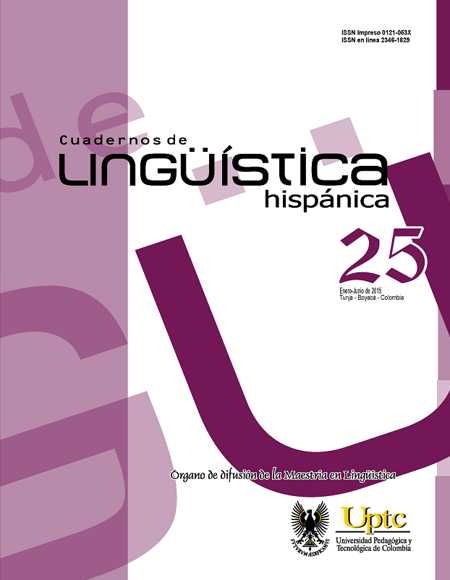Normalistas’ Written Performance in Workshops based on the Task Based Approach

Abstract
This research was developed with Complementary Training Program students – normalistas- at Escuela Normal Superior Santiago de Tunja. Its core purpose was to analyze and describe what the implementation of writing workshops under the task based approach for a group of Complementary Training Program students revealed about their written performance. This qualitative action research used interviews, students’ artifacts and field notes to gather information. Findings revealed that workshops helped students to strengthen their performance in several aspects such as vocabulary, grammar and structure and contributed to the students’ language development in the communicative field.
Keywords
written performance, Complementary Training Program students, written language development.
References
- Andrews, R. & Smith, A. (2011). Developing Writers: Teaching and Learning in the Digital Age. England: Open University Press. Retrieved from: http://biblio.uptc.edu.co:2117/lib/bibliotecauptc/docDetail.action?docID=10491761&p00=writing%20product
- Bachman, L. F. (1990). Fundamental considerations in language testing. Oxford: Oxford University Press.
- Brown, H. D. (2000). Teaching by Principles. United States: Prentice Hall.
- Carter, R., & Nunan, D. (2010). The Cambridge Guide to teaching English to Speakers of Other Languages. Cambridge: Cambridge University Press.
- Cassany, D. (1999). Construir la escritura. Barcelona: Paidos.
- Cohen, L., & Manion, L. (1994). Research methods in education. Fourth Edition. London and New York: Routledge.
- Crystal, D. (2008). A dictionary of linguistics and phonetics. (Sixth edition).UK: Blackwell.
- Hamp - Lyons, L., & Heasley, B. (2006). Study writing: a course in writing skills for academic purposes. (2nd Ed). New York: Cambridge.
- Hedge, T. (2003). Teaching and Learning in the Language Classroom. England: Oxford University Press.
- Hiebert, E. & Kamil, M., (2005). Teaching and learning vocabulary: Perspectives and persistent issues. In E. H.Hiebert and M. L. Kamil (Eds.), Teaching and learning vocabulary: Bringing research to practice (pp. 1–23). Mahwah, NJ: Lawrence Erlbaum. Retrieved August 18, 2009, from PsycINFO database.
- Izadpanah, S. (2010). A study on task-based language teaching: From theory to practice.US-China Foreign Language 8(3), 47-56.
- Kolin, M. (1981). In “A Conunent on ‘Grammar, Grammars, and the Teaching of Grammar. College E”ducolion 47(8), 874-897.
- Seliger, H. W. & Shohamy, H. (1989). Second Language Research Methods. (First edition). New York: Oxford University Press.
- Strauss, A. L., & Corbin, J. (1998). Basics of Qualitative Research: Grounded Theory Procedures and Techniques, 2nd edn. London: Sage.
- Webb, S. (2005). Receptive and productive vocabulary learning: The effects of reading and writing on word knowledge. Studies in Second Language Acquisition, 27, 33–52.
- Willis, J. (1996). A framework for task–based learning. Edinburg: Longman.